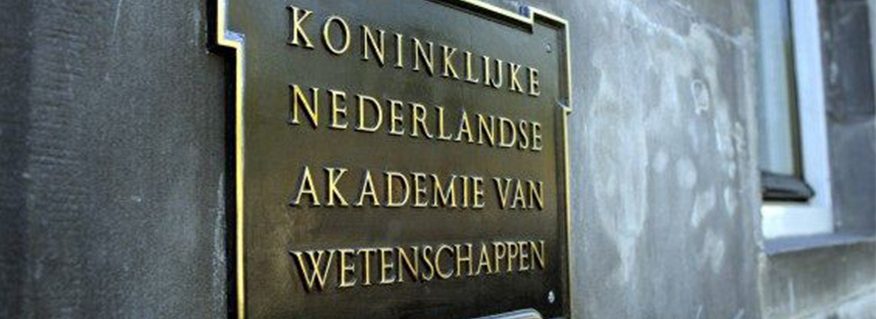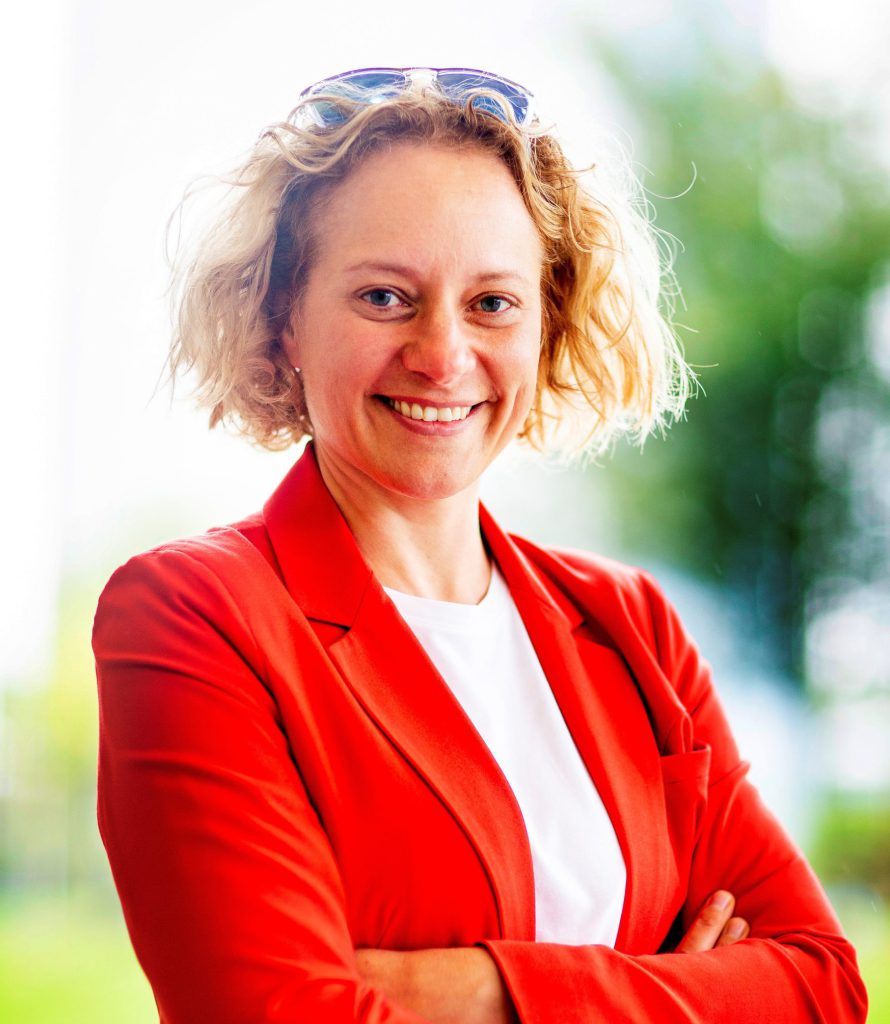12.05.2022Awards
Stephanie Wehner new member of Royal Netherlands Academy of Arts and Sciences

The Royal Netherlands Academy of Arts and Sciences (KNAW) has elected 22 new members, including QuTech professor Stephanie Wehner. Academy members, leading researchers from across all the disciplines, are selected for their scientific and scholarly achievements. The Academy has about 600 members and (at the time) QuTech members include Ronald Hanson, Barbara Terhal, Leo Kouwenhoven and Hans Mooij. Members are appointed for life. The new members will be installed on Monday 12 September 2022.
Stephanie Wehner (1977)
Professor of Quantum Information, Delft University of Technology

Stephanie Wehner started out as a hacker, and now occupies a world-leading position with her pioneering research and inspiring vision of a future quantum internet. This type of internet uses quantum effects such as entanglement and
non-local interactions to bring about new, secure and rapid forms of communication. By linking disciplines such as fundamental physics and computer science, Wehner has reshaped the field of quantum information. She leads
European research on a quantum internet, initiated a successful interdisciplinary conference and set up an interdisciplinary education programme. Wehner disseminates her vision enthusiastically via (TEDx) lectures and interviews with international media.
Interview
Below you can read an interview that appeared on the Quantum Delta NL website.
Stephanie, congratulations on your election as a member of the KNAW, the Royal Netherlands Academy of Arts and Sciences. What does that mean to you?
I am very glad and excited about it. It’s a special recognition, but it’s also a very good way to meet and talk to all those other scientists accomplished in other fields. That is one of the interesting parts for me. But to be completely honest, I have yet to find out more on what’s going on at the KNAW, I have only just become a member. But I see it as a great honour.
You started out as a hacker, trying to break in to networks and testing their security measures
Ha, that is true, I was always interested in communication, in how it’s used, and how these things work in practice.
Later on in my career, I was always somewhere between physics, where you try to understand how nature works, and computer science, which is a design science. A design science is about how to design a world out of thin air, and then figure out how it works and how one can use it to do useful things, rather than studying what is already there.
And you know, I still don’t want to pick sides. Of course, computer science and physics are not entirely disconnected either: the natural world still limits what is ultimately possible in what one can hope to compute or transmit.
So in that respect, quantum computing and information science really fits the bill for you
Yes, definitely. For me, it’s really about how we can go to the limits of what nature allows in terms of information technology, and how can we actually make that work and put it into practice. And given that we know that the world is quantum, that means that one has to go beyond what is possible classically.
So how did you get involved in quantum information?
I think, back in maybe 2003. I went to a public talk by John Preskill here in the Netherlands , and I found that really inspiring. I later did my postdoc at his group in Caltech in California. I’m interested the ultimate thing that one can do in the domain of communication.
Eventually, this path led you to be an author on the 2015 Delft entanglement paper, and now you are you’re leading the European Quantum Internet Alliance, a large European research cooperation
Yes, there are over 40 academic and industrial partners in Europe. Together, we’ve defined goals which are actually quite far away: at the end of 2029. [laughs] And that is something that I actually enjoy, because really bringing something into the real world is not something that any one person can do by themselves.
It requires quite a lot of disciplines and a lot of different people to do very different things. So this is what find exciting, because I care not just about the science and the abstract, but I enjoy trying to think about how can one really bring something into the real world. One needs quantum hardware, one needs classical hardware, one needs software, one needs applications, one needs, I don’t know, hundred different things. But then, we might just pull it off together.
And how is your own research doing?
There too, there are many things I’m excited about. Trying to bring a quantum network in the real world opens up a whole new area of computer science problems that I or anybody else haven’t really thought about before.
So one example, is the question: if we were to build a quantum network, how could we actually run a program on it? It’s nice to have hardware, but hardware alone is not going to do anything for you.
Together with my research group, we found a way to make such networks programmable, meaning that one can develop certain computer science abstractions to actually program applications on such a network, and develop a robust way of quantum communication.
This is hugely complicated. In the classic network science, it took a very long time to build relevant models and concepts to even analyse the problems. And now, again, we are only in the beginning of understanding how to do that. Many ideas from network science don’t apply to quantum networks. It means we need new ideas to make this work. So somehow we are in very many things back to square one.
In an interview in Nature, you say you have the chance to do it right from the start.
Yes, but I think I also said I’m actually quite convinced that we will not get it right from the start. I think looking at the history of classical networking, some things could have been done better. For example, the idea that maybe there’s also a security aspect to it, came much later.
So in that sense, I certainly see opportunities to do something right or better from the start. But things are always much easier in retrospect. You make choices, and later you realize that maybe you didn’t quite look at things the right way.
It is unavoidable. But I think that’s also perfectly fine. If you want to bring something into the real world, this is a bit of a dirty job: you have to make some concessions, choices and compromises.
But on the other hand. it’s also quite beautiful in that it inspires different ways of thinking that you maybe had not thought about in the abstract. I like that confrontation with reality. I think actually it inspires exciting research.
What to you is an exciting application of these networks?
Yes, there are many examples, but maybe one of the easiest to explain is secure delegated quantum computation. So let’s say I have a simple quantum terminal that can only prepare and measure one quantum bit at a time. And I want to run a simulation of a proprietary material on a quantum computer. But I don’t want that computer to find out what computation I’m performing. Then I could use the quantum network to upload the task, without even the computers servers learning about my computation -and my proprietary material- and then download the results again.
That said, I also think that the most interesting applications will not come from scientists, but from other people just using the quantum network, so I believe that it’s very important to give as many people as possible access to such technologies.
Computer science and physics were, used to be at least, and probably still are pretty male dominated fields. Did you ever feel hampered by this?
Well, it’s very weird in many situations. I have been to many meetings, to find I’m the only woman. And if there is another woman there, she will be someone’s assistant . That just feels strange.
Then there are assumptions that people make. I had a baby at the beginning of the pandemic, and some people expected me to kind of disappear after I had a child. And I think these are not the right expectations to convey.
Of course, there are more women in these fields than there used to be. But this is not the only thing you should be focusing on. Maybe you should ask yourself: why are these numbers so low? I have been in situations where the same person that says ‘let’s increase the number of women’, also questions whether I can still do my job after I return from maternity leave.
Are you involved with WIQD (Women in Quantum Development, a professional network for women in the quantum field in the Netherlands)?
Yes, I’m on the advisory board. I think that’s really great. I also like the fact that they’ve enacted policies which actually are an example now for other policies in Europe.
For example, they have a program that allows women to apply for funding not for themselves to go to a conference, but to arrange child care when going to a conference. This can mean either taking the kid along and having childcare there or bringing someone along or whatever works. And I think that’s really an excellent program because I see that preventing women to go for conferences.
Do you feel you have to speak up about this or do you feel other people have to speak up about this?
Well, I think everybody should speak up about it, men too. But I consider it my absolute duty to speak up on every possible occasion.

